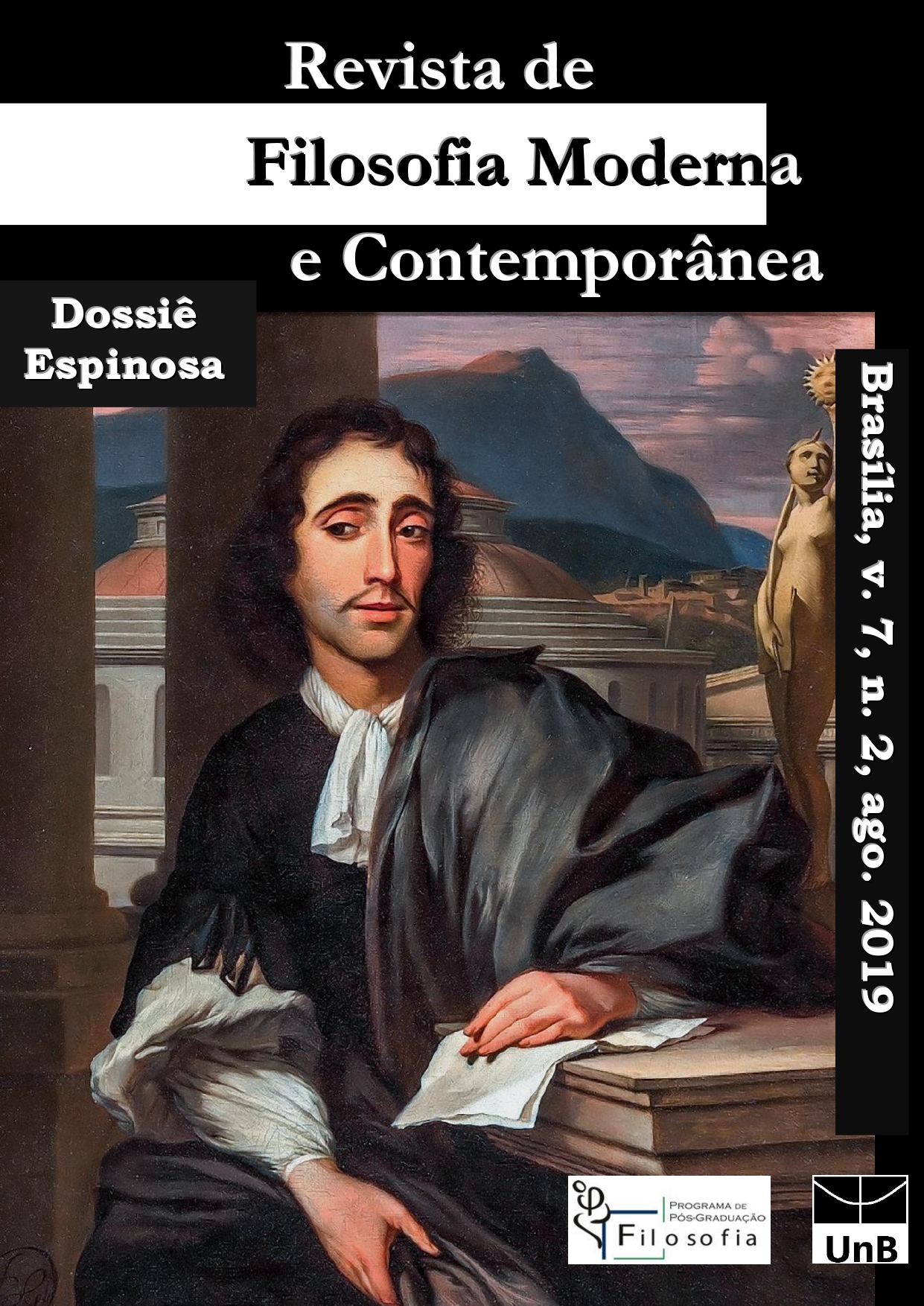De Dicto and De Re: A Brandomian experiment on Kierkegaard
DOI:
https://doi.org/10.26512/rfmc.v7i2.24797Palabras clave:
Kierkegaard, Brandom, Rational Reconstruction, Metaphilosophy, OntologyResumen
The recent historical turn within the analytic tradition has experienced growing enthusiasm concerning the procedure of rational reconstruction, whose validity or importance, despite its paradigmatic examples in Frege and Russell, has not always enjoyed a consensus. Among the analytic philosophers who are the frontrunners of such a movement, Robert Brandom is one of a kind: his work on Hegel as well as on German Idealism has been increasing interest in, as well as awareness of, Hegel’s contributions to some current problems in that tradition. Thus, this work aims to show Brandom’s methodology of rational reconstruction, based on the distinction between de dicto and de re inferences. Afterwards, I turn to Kierkegaard in order to make explicit some of his ontological commitments by applying Brandom’s approach as a valuable tool for doing history of philosophy.
Descargas
Citas
BEANEY, Michael. Frege: making sense. London: Duckworth, 1996.
____. “Analytic Philosophy and History of Philosophy: The Development of the Idea of Rational Reconstruction” in RECK, E. (ed.) The historical turn in analytic philosophy, New York, Palgrave Macmillan, 2013, pp. 231-260.
____. “Historiography, Philosophy of History and the Historical Turn in Analytic Philosophy” in Journal of the philosophy of history, vol. 10, 2, 2016, p. 211-234.
BERTO, F. Existence as a Real Property ”“ The Ontology of Meinongianism, Dordrecth, Springer, 2013.
BRANDOM, R. Making it explicit: reasoning, representing, and discursive commitment. Cambridge, Mass: Harvard University Press, 1994. (MIE)
____. Tales of the mighty dead ”“ historical essays in metaphysics of intentionality, Cambridge: Harvard University Press, 2002. (TMD)
CAPLAN, B. “Ontological Superpluralism,” Philosophical Perspectives, 25.1: 2011, pp. 79”“114.
DUMMETT, M. Frege: Philosophy of Language, Cambridge: HUP, 1973.
FERREIRA, G. “Kierkegaard Descends to the Underworld: Some remarks on the Kierkegaardian appropriation of an argument by F. A. Trendelenburg”. Cognitio, vol. 14, n. 2, 2013, pp. 235-246.
____. “‘The philosophical thesis of the identity of thinking and being is just the opposite of what it seems to be’ : Kierkegaard on the relations between Being and Thought”. Kierkegaard Studies Yearbook, 2015, pp. 13-31. (DOI: 10.1515/kierke-2015-0103).
____. “‘O que nosso tempo mais precisa’: Kierkegaard e o problema das categorias na filosofia do século XIX, Kriterion, vol. 58, n. 137, 2017, pp. 333-350. (DOI: 10.1590/0100-512x2017n13706gfs).
FREGE, G. Die Grundlagen der Arithmetik, eine logisch mathematische Untersuchung über den Begriff der Zahl. Introduction. Breslau: W. Koebner. Transl. by M. Beaney in M. Beaney (ed.). The Frege Reader. Oxford: Blackwell, 1997, p. 84-91.
GABRIEL, M. Fields of sense ”“ a new realist ontology, Edinburgh: EUP, 2015.
GARBER, D. “What’s philosophical about the history of philosophy” in SORREL, T; ROGERS, G. A. J. (eds.) Analytic philosophy and history of philosophy, Oxford: OUP, 2005, pp. 129-146.
KIERKEGAARD, S. Concluding unscientific postscript ”“ vol. 1, Princeton, New Jersey: Princeton University Press, 1992. (CUP)
_____. Philosophical Fragments; Johannes Climacus, or De omnibus dubitandum est. New Jersey: Princeton University Press, 1985. (PF)
LENZ, M. “Did Descartes read Wittgenstein? ”“ Towards a Conceptual Geography”, available at https://www.academia.edu/35021042/Did_Descartes_Read_Wittgenstein_Towards_a_Conceptual_Geography, 2017.
LÆRKE, M., SMITH, J., SCHLIESSER, E. Philosophy and Its History: Aims and Methods in the Study of Early Modern Philosophy. Oxford: Oxford University Press, 2013.
MCDANIEL, K. “Ways of being” in CHALMERS, D.; MANLEY D.; WASSERMAN, R. (eds.). Metametaphysics: New Essays on the Foundations of Ontology, Oxford University Press, 2009.
____. The fragmentation of being, Oxford: OUP, 2017.
MEINONG, A. Theorie de l’objet et Présentation personnelle, Paris: Vrin, 1999.
MERCER, C. “The Contextualist Revolution in Early Modern Philosophy”. Journal of the History of Philosophy, 57(3), pp. 529”“548, 2019 (doi:10.1353/hph.2019.0057).
MILLER, B. The fullness of being ”“ a new paradigm for existence, Notre Dame: UND Press, 2002.
QUINE, W. ‘Quantifiers and propositional attitudes’. Journal of Philosophy, 53, 1956, 177-187.
____. “Existence and Quantification,” in Ontological Relativity and Other Essays, Columbia University Press, 1969.
RECK, E. H. The historical turn in analytic philosophy. Basingstoke, Hampshire New York, NY: Palgrave Macmillan, 2013.
REDDING, P. “The Analytic Neo-Hegelianism of John McDowell & Robert Brandom” in HOULGATE, S.; BAUR, M. (eds.) A companion to Hegel, Oxford: Blackwell, 2011, pp. 576-593.
RUSSELL, B. A critical exposition of the philosophy of Leibniz, New York: Routledge, 2005.
____. The philosophy of logical atomism, Oxford: Routledge, 2010.
THONHAUSER, G. Ein rätselhaftes zeichen ”“ zum verhältnis von Martin Heidegger un Søren Kierkegaard, Berlin: De Gruyter, 2016.
TURNER, J. “Ontological pluralism”. The Journal of Philosophy, vol. 107, 2010, pp. 5-34.
WEBB. C. “Kierkegaard's Critique of Eudaimonism: A Reassessment”. Jour. of Relig. Eth., 45: pp. 437-462, 2017 (doi:10.1111/jore.12185).
Descargas
Publicado
Cómo citar
Número
Sección
Licencia
Los derechos de autor para artículos publicados en esta revista son del autor, con derechos de primera publicación para la revista. Debido a que aparecen en esta revista de acceso público, los artículos son de uso gratuito, con atribuciones propias, en aplicaciones educativas y no comerciales.


